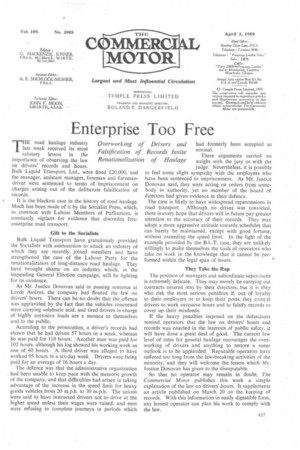Enterprise Too Free
Page 35

If you've noticed an error in this article please click here to report it so we can fix it.
THE road haulage industry last week received its most salutary lesson in the importance of observing the law on drivers' records and hours.
Bulk Liquid Transport, Ltd., were fined £20,000, and the manager, assistant manager, foreman and foremandriver were sentenced to terms of imprisonment on charges arising out of the deliberate falsification of records.
It is the blackest case in the history of road haulage. Much has been made of it by the Socialist Press, which, in common with Labour Members of Parliament, is constantly vigilant for evidence that discredits freeenterprise road transport.
Gift to the Socialists Bulk Liquid Transport have gratuitously provided the Socialists with ammunition to attack an industry of which they are recently joined members and have strengthened the case of the Labour Party for the renationalization of long-distance road haulage. They have brought shame on an industry which, in the impending General Election campaign, will be fighting for its existence.
As Mr. Justice Donovan said in passing sentence at Leeds Assizes, the company had flouted the law on drivers' hours. There can be no doubt that the offence was aggravated by the fact that the vehicles concerned were carrying sulphuric acid, and tired drivers in charge of highly corrosive loads are a menace to themselves and to the public.
According to the prosecution, a driver's records had shown that he had driven 57 hours in a week, whereas he was paid for 118 hours. Another man was paid for 102 hours, although his log showed his working week as one of 60 hours. A third driver was alleged to have worked 95 hours in a six-day week. Drivers were being paid for an average of 16 hours a day.
The defence was that the administrative organization had been unable to keep pace with the meteoric growth of the company, and that difficulties had arisen in taking advantage of the increase in the speed limit for heavy goods vehicles from 20 m.p.h. to 30 m.p.h. The unions were said to have instructed drivers not to drive at the higher speed unless their wages were raised, and men were refusing to complete journeys in periods which had formerly been accepted as normal.
These arguments carried no weight with the jury or with the judge. Nevertheless, it is possible to feel some slight sympathy with the employees who have been sentenced to imprisonment. As Mr. Justice Donovan said, they were acting on orders from somebody in authority, yet no member of the board of directors had given evidence in their defence.
The case is likely to have widespread repercussions in road transport. Although no driver was convicted, there is every hope that drivers will in future pay greater attention to the accuracy of their records. They may adopt a more aggressive attitude towards schedules that can barely be maintained, except with good fortune, without exceeding the speed limit. In the light of the example provided by the B.L.T. case, they are unlikely willingly to make themselves the tools of operators who take on work in the knowledge that it cannot be performed within the legal span of hours.
They Take the Rap The position of managers and subordinate supervisors is extremely delicate. They may merely be carrying out contracts entered into by their directors, but it is they who risk the most serious penalties if, out of loyalty to their employers or to keep their posts, they compel drivers to work excessive hours and to falsify records to cover up their misdeeds.
If the heavy penalties imposed on the defendants remind operators that the law on drivers' hours and records was enacted in the interests of public safety, it will have done a great deal of good. The current low level of rates for general haulage encourages the overworking of drivers and anything to restore a saner outlook is to be applauded. Reputable operators have suffered too long from the law-breaking activities of the minority, and they will welcome the lesson which Mr. Justice Donovan has given to the disreputable.
So that no operator may remain in doubt, The Commercial Motor publishes this week a simple' explanation of the law on drivers'thours. It supplements an article published on March 20 on the keeping of records. With this information in easily digestible form, any honest operator can plan his work to comply with the law.
































































































































